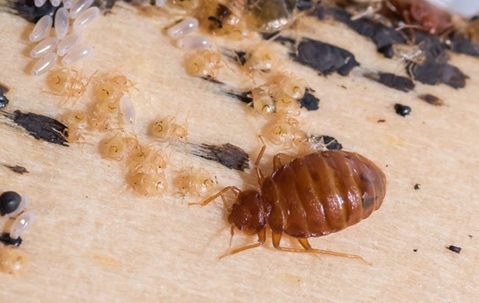Bed Bug Exterminator Houston LLC: Dependable Solutions for Bed Bug Problems
Efficient Pest Control Measures to Shield Your Yard and Plants
In the realm of horticulture, the consistency of a well-tended yard can often be disrupted by unwanted parasites that endanger the health and wellness and vigor of plants. As gardeners aim to preserve a thriving exterior room, the obstacle of insect control becomes an essential facet of their gardening endeavors. Carrying out effective bug control determines not just safeguards the garden's visual allure yet additionally plays a critical duty in protecting the plants' health. By discovering a variety of strategies that encompass all-natural repellents, helpful insects, buddy planting, DIY remedies, and environmentally-friendly pesticides, garden enthusiasts can navigate the complex world of parasite monitoring with accuracy and treatment.
All-natural Insect Repellents

One more reliable all-natural bug repellent is diatomaceous planet, a grainy material made from fossilized aquatic organisms. Diatomaceous planet works by physically hurting pests with its abrasive texture, making it an outstanding choice for managing bugs like slugs, beetles, and caterpillars. Additionally, growing companion plants like marigolds, lavender, or basil can help drive away bugs as a result of their strong fragrances or natural chemical compounds.
Beneficial Insects for Bug Control

One more valuable pest is the parasitic wasp, which lays its eggs inside bug insects, eventually eliminating them. Ground beetles are superb for managing caterpillars, snails, and slugs. Hoverflies, commonly mistaken for as a result of their comparable look, eat aphids, thrips, and caterpillars.
To draw in beneficial bugs to your yard, you can grow a varied variety of flowering plants, such as dill, fennel, and yarrow, which offer nectar and pollen for grown-up insects. Additionally, avoid utilizing broad-spectrum pesticides that can hurt both dangerous and advantageous insects. By creating a welcoming environment for these advantageous pests, you can decrease the need for chemical pesticides and promote a much healthier, a lot more well balanced yard ecosystem.
Companion Planting Methods
When intending to boost the effectiveness of useful insects in your yard for natural bug control, taking into consideration friend growing approaches can additionally enhance the community equilibrium. Companion growing includes strategically positioning specific plants alongside each other to optimize their common advantages, such as hindering bugs, bring in beneficial bugs, or enhancing nutrition uptake - bed bug exterminator houston near me. One preferred example is growing marigolds alongside tomatoes to fend off nematodes and other unsafe insects while additionally bring in pollinators
In addition, integrating fragrant natural herbs like basil, mint, or rosemary in between veggie rows can aid prevent bugs with their solid aromas. One more effective approach is planting flowers such as sunflowers, zinnias, or cosmos to bring in pollinators like and butterflies, which in turn can aid in cross-pollinating your fruit and vegetable plants. Furthermore, planting trap plants like nasturtiums can divert bugs away from your main crops, working as sacrificial plants that protect your useful produce. By implementing friend growing approaches, you can develop a diverse and harmonious yard community that normally manages parasites while advertising plant health and wellness and productivity.
Do It Yourself Parasite Control Solutions
To successfully manage parasites in your yard, carrying out do-it-yourself parasite control remedies can be a cost-effective and eco friendly method. One typical DIY parasite control option is developing homemade insecticidal soaps by mixing mild soap with water to manage soft-bodied insects like aphids, mites, and whiteflies. Furthermore, introducing advantageous insects such as ladybugs, lacewings, and predacious wasps can aid naturally control insect populaces in your yard. Establishing physical barriers like row covers or netting can additionally prevent parasites like caterpillars from harming your plants.
Buddy growing specific natural herbs and blossoms like marigolds, basil, and lavender can assist ward off pests and bring in advantageous insects. By including these DIY bug control options into your horticulture regimen, you can shield your yard and plants without depending on severe chemicals.
Environmentally-Friendly Pesticides

One more effective alternative is diatomaceous earth, an all-natural material made from fossilized aquatic organisms, which can be sprayed around plants to manage slugs, snails, and other crawling bugs. In addition, insecticidal soaps and oils originated from plant-based resources are beneficial for controlling soft-bodied pests like aphids, mites, and whiteflies.
Final Thought
In final thought, efficient pest control actions such as natural repellents, helpful pests, friend growing techniques, DIY options, and environmentally-friendly pesticides are crucial for securing your yard and plants. By carrying out these techniques, you can stop damage brought on by bugs and preserve a bed bug exterminator houston llc healthy and growing yard environment. It is essential to take into consideration the long-lasting effect of utilizing pesticides and go with more lasting and eco-friendly alternatives to guarantee the health and wellness and health of your plants and the atmosphere.